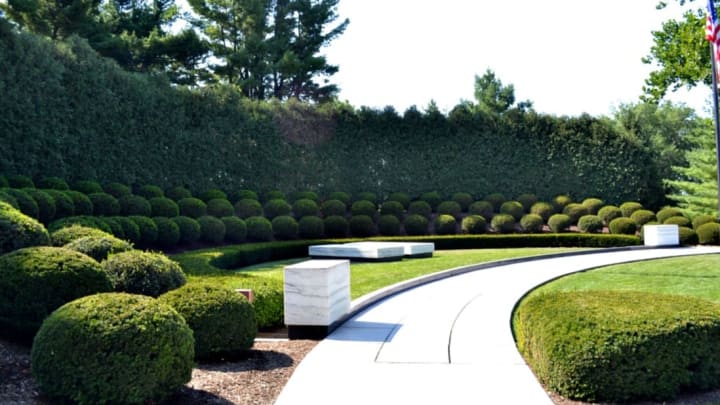Herbert Hoover

For years, every time we so much as touch a toe out of state, I’ve put cemeteries on our travel itinerary. From garden-like expanses to overgrown boot hills, whether they’re the final resting places of the well-known but not that important or the important but not that well-known, I love them all. After realizing that there are a lot of taphophiles (cemetery and/or tombstone enthusiasts) out there, I’m finally putting my archive of interesting tombstones to good use. See all the Grave Sightings posts here.
Forget Parker Lewis. Before he became the president that will always be remembered for plunging the country into the Great Depression, Herbert Hoover couldn’t lose. He had career success—in fact, he was the most well-paid mining engineer in the world at one point in time. He was a humanitarian respected worldwide when he organized relief for German-occupied Belgium during WWI. Woodrow Wilson asked Hoover to be the head of the U.S. Food Administration, and later Warren G. Harding appointed him Secretary of Commerce.
In 1920, a New York Times poll showed that the public believed Hoover was one of the greatest living Americans. No less than FDR himself said, “He certainly is a wonder, and I wish we could make him President of the United States. There could not be a better one.”
Roosevelt jinxed it—and Hoover seemed to know it. When he became president-elect in 1928, Hoover was already wary. “My friends have made the American people think me a sort of superman,” he said in December. “They expect the impossible of me, and should there arise in the land conditions with which the political machinery is unable to cope, I will be the one to suffer.”
Conditions arose. In a matter of months, Hoover went from being the most celebrated man in America to the most hated. Time magazine referred to him as “President Reject.” People started calling newspapers “Hoover blankets” and dubbed the encampments of unemployed people “Hoovervilles.” He was booed everywhere he went; angry citizens literally threw tomatoes at his train when it passed through their towns. It came as no surprise to anyone, least of all Hoover, when FDR swept the 1932 election.
He could have disappeared into the annals of history after his ouster, but instead, Hoover dedicated himself to public service, raising money for charitable causes, organizing WWII relief missions, becoming chairman of the Boys’ Clubs of America, and delivering dozens of speeches across the country every year. Even at the age of 86, Hoover was working up to 12 hours a day. "There is no joy to be had from retirement, except in some kind of productive work,” he said. “Otherwise you degenerate into talking to everybody about your pains and pills. The point is not to retire from work or you will shrivel up into a nuisance to all mankind."
In his later years, Hoover was asked how he managed to deal with the decades of blame and hatred that surrounded his presidency. “I outlived the bastards,” he said. And he really did—Hoover lived to be 90 years old, passing away in 1964. Should you want to visit Hoover and his wife, Lou Henry Hoover, they can both be found in a lovely park-like setting at his Presidential Museum in West Branch, Iowa, not far from Iowa City.
See all the Grave Sightings posts here.